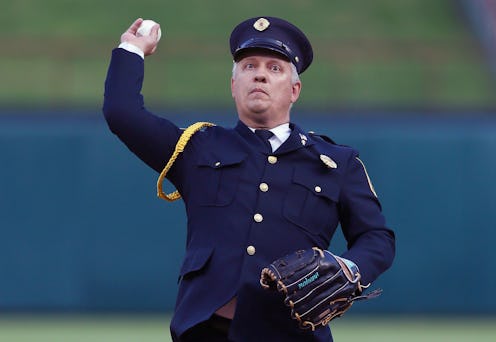News
Christopher Suprun Is A Proud Faithless Elector
With just two weeks before the Electoral College meets to formally elect the next President of the United States, online chatter about the potential for faithless electors to change the election's outcome has reached a fever pitch. And although it's highly unlikely that enough Republican Party-appointed electors would deny Donald Trump, soon-to-be faithless elector Chris Suprun's op-ed in The New York Times has reignited a faint glimmer of hope.
"I am a Republican presidential elector, one of the 538 people asked to choose officially the president of the United States," the Texas paramedic writes in the opening lines of his New York Times piece, published Monday. He goes on to note that he has already fielded numerous requests "to change my vote based on policy disagreements with Donald J. Trump," but adds that he doesn't consider such differences of opinion to be valid reasons to vote against the wishes of his fellow Texans.
However, Suprun also makes clear that his loyalty is not to one candidate, but to his country. "I have poured countless hours into serving the party of Lincoln and electing its candidates," he wrote. "I will pour many more into being more faithful to my party than some in its leadership. But I owe no debt to a party. I owe a debt to my children to leave them a nation they can trust."
And that is why Suprun is refusing to cast his electoral vote for Trump. Instead, he plans to cast his vote for Ohio Gov. John Kasich, a relatively moderate Republican and former presidential hopeful. On his Twitter account, Suprun has pledged to read all incoming tweets and messages about his decision to become a "faithless elector." He might not be able to respond to all of them, he said, but he has committed to reading them and responding to the letters he's received.
Suprun is a Dallas-based paramedic and self-proclaimed longtime Republican. In 2001, he was a New York City firefighter and paramedic who was among the first responders to rush into the Twin Towers when terrorists attacked the World Trade Center on Sept. 11. The national mourning and response that followed that dark day was the last time the country seemed truly united, Suprun wrote in his Times editorial.
Suprun is also a founding member of the Never Forget Foundation, a nonprofit public charity that, according to its website, helps coach youth on overcoming adversity by using the lessons of 9/11 and other tragedies, provides training for groups and community members responding to disaster, and administers a scholarship to youth whose educational opportunities have been impacted by such tragedies.
On the thirteenth anniversary of Sept. 11 in 2014, Suprun threw the ceremonial first pitch at Kauffman Stadium, as the Kansas City Royals hosted the Boston Red Sox, according to MLB.
In his Times piece, Suprun frames his commitment to his country as a key reason why he won't cast his electoral vote for Trump.
"The election of the next president is not yet a done deal," he wrote. "Electors of conscience can still do the right thing for the good of the country. Presidential electors have the legal right and a constitutional duty to vote their conscience."
While that is true, Trump's overwhelming lead in the Electoral College makes the likelihood of faithless electors changing the outcome of the election almost non-existent. Even if a minimum of 35 other electors accept Suprun's call to vote for another Republican candidate, the best-case-scenario would see Trump denied the 270 electoral votes he needs to assume office. Then, however, the fate of the election would be handed down to the Republican-controlled House of Representatives.
Despite the GOP's frequent condemnation of Trump's rhetoric during the campaign, most high-ranking Republicans have dutifully lined up behind President-elect Trump. Their newfound loyalty suggests an electoral outcome determined by the House would almost certainly mimic the actual results of the electoral college.
